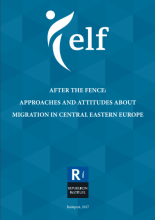The migration crisis in 2015 was a real game changer not just in Central Europe, but in the whole European Union and also in the United States. The crisis, the fear from refugees triggered indirectly the Brexit and it was also a serious issue during the 2016 US presidential election campaign. The pictures of refugees walking by foot on a Hungarian highway towards Austria appeared in one of Donald Trump’s campaign videos as well.
But not just images went viral during the crisis. Alongside of the general confusion, fear and feeling of uncertainty also the techniques and issues of the populist right intensified and diffused. After the peak of the crisis, in the 2016 it seemed that the new political cleavage will be run between globalist and sovereignists. The former club refers to humanitarian duties while the latter to national sovereignty. During the US presidential campaign became this dichotomy especially visible and crucial.
For populist politicians however, not merely migration is an issue, but the assumed “background” forces, which wish to push migrants toward wealthier countries. With this narrative trick the migration can be presented not just a global challenge but part of conspiracy in which also domestic parties, that is the adversaries of the populist politician are involved. However, with the migration issue populist politicians also aim to demonstrate their willingness to act for the interests of the people, unlike the establishment. Exactly this momentum, political agency is a central point of the populist narrative: action is needed to defend national sovereignty, while action is only possible on the ground of national sovereignty and not through international institutions like the European Union.
It is hard to challenge this populist narrative for opposition parties, as Bálint Madlovics demonstrates in chapter. The narrative of the governing Fidesz party is not only about hate or xenophobia. Rather Fidesz first succeed to maintain the migration issue as a number one debate in Hungarian politics with the so called national consultations, whereby questionnaires are sent to each Hungarian citizen in order to ask their opinion on various issues. However, these questionnaires are biased and serve the government’s need to create a referable multitude.
In 2017 national consultations were held on EU’s migration regulation and on the so called “Soros-plan”. Also, the referendum on the refugee resettlement quota proposed by the Commission served the Fidesz’s aim to maintain the migration issue on the agenda. According to Madlovics the supporters of Fidesz do not “hate” migrants but wishes to live in a “safe and sovereign” country as it is put forward by the government. The opposition hopes to shift the attention from the migration issue by highlighting the bad economic situation of the country. No migrants would stay in Hungary anyway as the salaries are low and the welfare system do not work, suggests the interpretation of the opposition.
The refugee crisis triggered political debates and different measures not only in Hungary but in the European Union as well. As Andras Toth-Czifra pointed out in his chapter, there has been two concepts on mitigation the refugee pressure. On the one hand Viktor Orbán advocated to block the WesternBalkan route. This plan was later supported by countries like Austria and Macedonia. On the other hand particularly the Netherlands and Germany supported an agreement with Turkey, which would include a readmission agreement and legal pathways for migration. At the same time harsh treatment of refugees and low acceptance rate of asylum applications became a norm in the some new member states as Toth Czifra noted it.
However, as István Hegedűs writes in detail in his chapter, the various EU institutions were ready to tackle the refugee challenge and to open a discussion with the member states. Institutions, like the European Asylum Support Office (EASO), the reformed Common European Asylum System (CEAS) and the new European Union Agency for Asylum (EUAA) all aims to find and put forward a common asylum policy and solution.
Nevertheless proper refugee and asylum policy is inevitable as many people are suffering during the political debates. As it is demonstrated by Helena Liberšar on the Slovenian case, asylum seekers do not get medical treatment, unless it is urgent. But since their process can last until months, even years, their health can be damaged seriously. But the refugee question is also interconnected with security issues as Katarzyna Przybysławska explains it in her chapters. In this case security may refer to border procedures, refugee status determination process and the exclusion clauses and to the safety of refugees in the host country. Creating security for registered asylum seekers involve the fight against hate speech and radical nationalism.
In the chapter of Orsolya Szabó Palócz several good practices of anti-hate civil actions are presented. Finally, in the last chapter the detailed description of the Subjective Values Foundation’s activities gives us an insight how to fight the negative social effects of the refugee crisis on the spot.
